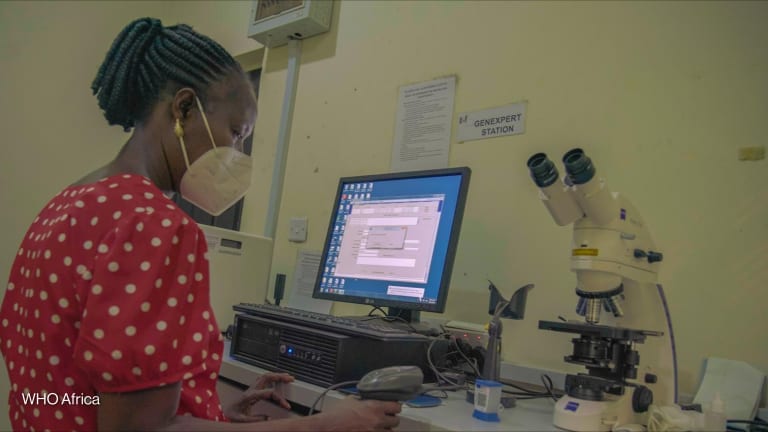
NEW YORK — Lack of awareness and research solutions on eradicating the deadly, airborne disease tuberculosis, is pushing global reduction targets out of reach, experts warned in New York last week.
While TB deaths fell globally by 37 percent between 2000 and 2016, the bacterial disease remains one of the top 10 causes of deaths worldwide, responsible for 1.7 million lost lives in 2016.
“Progress is too slow. Increasingly, the rate of the number of resistant TB cases is a challenge, along with gaps in investment and research,” Tereza Kasaeva, director of the global tuberculosis program at the World Health Organization, explained to Devex.
“In spite of 53 million saved lives [between 2000 and 2016], in spite of a lot of activities, there are not enough outcomes between stakeholders and partners. We see our role revising the situation, to first of all, increase coordination.”
What are the strategies to make 2018 the year for TB action?
September is crunch time for governments, with the United Nations convening high-level meeting, “United to end tuberculosis: a global response to a global emergency.” So, how exactly are TB advocates working to achieve high-level commitments before September?
The media briefing on TB came one day after a civil society meeting on TB at the U.N. headquarters. Both events served as a lead-up to the first high-level U.N. TB meeting in September. The forum could “be a political solution to the political problem of TB,” Joanne Carter, vice chair of the Stop TB Partnership Coordinating Board, said during the briefing.
“TB is preventable, it is treatable, and in almost all cases, it is curable,” she said. “We are not getting quality treatment to 40 percent of people who are sick with TB — and we have data that tells us, district by district, where these people are.”
WHO’s End TB Strategy aims for a 90 percent decrease in TB deaths by 2030.
Gaps in awareness, insufficient investment in research and development, and social stigma all contribute to the persistent problem of TB, first recognized in the late 1800s.
“There are people who are invisible in all of our countries, people who fall through the cracks in the health system, and people who cannot complete treatment,” said Dean Lewis, Asia Pacific regional focal point for the Global Coalition of TB Activists.
He remarked on the startling difference in his own two personal experiences of contracting TB in his native India — once, as a middle-income child, and then again as a homeless adult, where he found it much harder to obtain treatment.
“That adds to the burden — the health burden, our finance burden, it undermines our country’s security in terms of health risks,” he continued.
“People who have it often don’t know, or why [they’re] taking medication they are taking. Fear leads to it being silent. One of the most difficult things we have had to do is organize community.”
In India, which has the highest burden of TB, treatment covers 63 percent of people — but there are still more than 1 million people considered missing that are not identified or receiving treatment.
An estimated 11 million TB cases are expected to be diagnosed and treated in India through 2022. Although the country aims to eradicate TB by 2025.
Overall, about 64 percent of new cases are concentrated in India, Indonesia, China, Philippines, Pakistan, Nigeria, and South Africa, according to the WHO Global Tuberculosis Report 2017.
Increasingly, these countries are facing the added problem of a growing resistance to available TB drug treatments.
While the treatment success rate for people diagnosed with TB was 83 percent in 2015, there were 600,000 new cases of resistance to the antibiotic rifampin — the most effective drug to treat TB — in 2016, according to U.N. figures.
Resistance rates vary in different countries, but both improper and incomplete treatment for TB play a role, Kasaeva said. Those who do not complete proper treatment can become especially vulnerable to new infections, as drug-resistant forms of TB are considered more aggressive.
“We do not have many good options for treating people, then,” Kasaeva said.
People with TB undergoing treatment will normally take a cocktail of five drugs that are considered dated and can have various negative side effects, from body pain to deafness, according to Lucica Ditiu, executive director of the Stop TB Partnership.
“One of the things we dramatically need is the awareness that it [TB] is still a problem,” Ditiu said. “You can get infected during a flight if someone is not treated — irrespective of how healthy [you] are. It does not matter.”
In 2017, there was a funding gap of $2.3 billion for treatment and care, and a gap of $1.2 billion for research and development. Most available funding has materialized from domestic sources.
“When funding the TB response, one point is implementation and research. Research means money for new tools. The tools we have right now are completely inadequate for the time we are living in,” Ditiu said. “In R&D, we are in a huge need, and are very dry, in need of water. Any drop will count.”
The high-level meeting on TB will take place at the U.N. on September 26.








